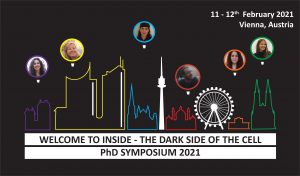Organizing an international Symposium during COVID-19? Not an easy task. In her blogpost, PhD student Sara explains how she and her team turned something virtual and detached into something interactive that resembled the atmosphere of a real congress.
“Taking part in the organization of a PhD Symposium, how difficult could it be? It’s going to be fun and also look good on my CV!”. That’s what I thought at the end of 2019, when I volunteered with other PhD students to organize the “INSIDE – The Dark Side of the Cell” PhD Symposium 2020.
Well…That did not go as smoothly as I planned. As we all know, after a few months we had to face one of the worst pandemics of the last 100 years. Indeed, as many other events, the Symposium had to be postponed to 2021, while we were going through our first lockdown.
Understanding how organisms maintain homeostasis upon environmental stresses
I am Sara, PhD student in Molecular Biology at the Max Perutz Labs. Born and raised in Rome, I moved to Vienna in 2017 to pursue my doctoral studies. The project I am currently working on investigates how cellular networks are dynamically regulated in immune cells, in particular, how the levels of critical immune proteins are tightly controlled in order ensure a proper inflammation resolution. “Can I say it in an easier way? Ah yes!” As everything in life is about balance, also the abundance of those regulators needs to be controlled: not too little, not too much, just right!
Last February together with Martina, Alberto, Konstantina, Aleksandra, and Christina, I organized my first online Symposium of the international PhD program “Signaling Mechanisms in Cellular Homeostasis”. The unifying theme of our Symposium was driven by the long-standing interest in understanding how organisms maintain homeostasis upon environmental stresses.
The pandemic completely changed our way of communicating
How do you organize an online Symposium? “I have no idea”, I thought at first. At the beginning, we had no clue where to start and how to make it work. I had previously been helping out in some in person congresses and I was quite confident about the organizational process. Of course, COVID-19 outbreak was not in my plans.
“Ok so, no food or drinks provided” that was very clear, “I can tick this off the list…” I thought. “No location needed either”, hotel reservations had to be cancelled. Half of our “to do list” was crossed out, but what was then left? The most important part, the core of the Symposium was still there. We still had to come up with a strategy to bring together excellent scientists and students from across the world, allowing them to share scientific ideas and great discoveries. By holding the meeting online, we reached out to as many talented people as possible to recruit outstanding speakers and a broad, diverse audience.
In the end, 450 people from all over the world registered to listen to a line-up of 20 speakers, from up and coming young group leaders to established world class scientists!
The COVID-19 pandemic completely changed our way of communicating with each other. In person meetings are crucial for researchers to establish collaborations and to get feedback from other experts. They represent essential opportunities, especially for PhD students, to develop further as successful independent scientists. For these reasons, the scientific community had to quickly adapt to a new way of gathering. While on one hand the pandemic did not allow us to get in touch as we wanted, on the other hand, it gave us the opportunity to create countless new connections with students and researchers from all over the world by meeting online, which would have been impossible with an in person event.
A virtual space where people could get together
I think our main challenge was to turn something virtual and detached into something interactive that somehow resembled the atmosphere of a real congress. We decided to do that by providing a virtual space where people could get together during coffee or lunch breaks, virtually take a walk in the Viennese vineyards or in the Schönbrunn Palace while discussing about experiments, or relax in cozy Viennese coffee houses.
Then, finally the day came. “Are people going to show up? Or is this going to turn out into a big failure?” You are there, in front of your computer, waiting for people to join the meeting… Fifty people have joined the meeting, now eighty. “Is the internet connection going to be good enough?” I kept on worrying. Ninety, one hundred, the number of participants was rising quickly… “Are the speakers’ slides going to freeze in the middle of their talks?”. Hundred and fifty, two hundred… “Ok, time to start, take a deep breath and…Welcome everybody to “INSIDE – The Dark Side of the Cell” PhD Symposium 2021!”




